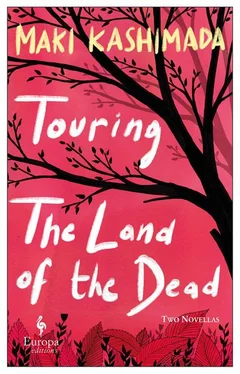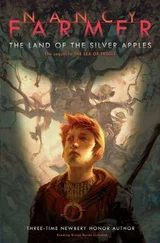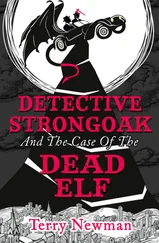That was how she had felt when she first met Taichi. She couldn’t pin down exactly why, but she found herself wanting to marry him. She could only imagine her mother’s resentment were she to wed a man so far removed from her mother’s ideals. Some evil influence practically tempted her to do it.
Before she introduced Taichi to her, her mother had said: We’ll have to go to Monaco for your honeymoon. I’d love to visit Monte Carlo. She took it for granted that she would go with them. And her brother too, of course. They both loved to gamble. It was a way of making a fortune out of nothing, without spending any effort at all. They believed in that kind of magic. So Natsuko and Taichi ended up simply not having a honeymoon.
But the one who always met with good fortune was Taichi. Like when he was able to have the brain surgery so soon due to a sudden cancellation. The same people who wouldn’t spare Natsuko a second glance would, for some reason, shower Taichi with all manner of kindness. It happened all the time. Even at the hospital. “I’m sorry about my husband. He can be so stubborn,” she would say. But the doctor would merely laugh: “He sure is, isn’t he?” And he would pat Taichi on the head. The doctors were only kind to Taichi. When they spoke to her, they did so coolly. “After all, a doctor is a patient’s ally,” her mother once said, flaring her nostrils with resentment as she all but spat out the words.
The hospital to which Taichi had been admitted was the same one that Natsuko’s father had gone to. That was no coincidence. It had a specialist neurosurgery ward, and so other institutions would send their patients there once they had given up on helping them.
It must be some kind of horrible disease, her mother said. He’d already started getting dementia. Yes, I’m sure of it. No matter how many years passed, you were always nine to your father. And you know, he would always find a way to sneak out, to withdraw some cash using a card on the verge of expiring, and then he’d use the money to go drinking. And I was the one who always caught the blame for it. Why did they have to do that?
When her mother spoke like this, her face showed no sign of sadness. Only annoyance. As if, while facing her daughter, she wanted to say: They should have blamed your father. They should have blamed him, not me. Why didn’t they punish him ?
Without exception, her mother’s stories always ended up descending into a litany of complaints. Even now, Natsuko could hear her rambling on: Once, the doctor said to me that I wasn’t coming to visit him enough. The hospital was so far away, but he didn’t care. He told me that I should come more often. And then he asked me—me!—whether I had a lover somewhere, whether that was why I wasn’t coming as often as he thought I should. I ran off to the bathroom, sobbing so hard! It’s true! I couldn’t stop sobbing.
Her mother would go on telling this story for years after Natsuko’s father passed away. Quite as if she were recounting it to her for the first time all over again. And it always ended the same way, with that word, sobbing . It never failed to get on Natsuko’s nerves every time she heard it. She couldn’t accept that word, sobbing , on a purely physical level. It drove her crazy. She always thought that the most miserable part of the story wasn’t her father’s idiotic behavior, nor the horrible way that the doctor had treated her mother, but rather that hopelessly stupid word, sobbing . That was how she felt. Her mother couldn’t forgive her father, nor the doctor either. She wanted to convey how unfairly she had been treated, how miserable and unhappy it had all made her. But the only word that she had to express that tragedy, the only word that ever came to mind, was always that one— sobbing .
Whenever she heard it, Natsuko thought that no matter what kind of unhappiness were to befall her mother, she wouldn’t change, that even if an altogether different kind of unhappiness were to befall her, she would still insist on using that word, sobbing . She had no other way of expressing herself. It was pitiful, really. She would finish off that episode the same way, sobbing, forever, without ever having learned anything from it. And what was even more miserable about it was that she herself wouldn’t realize that fact at all. Even if it were pointed out to her, she wouldn’t accept it, or else she would suffer a mental breakdown. She no doubt still thought that she could be treated like a princess. She believed that the age of her own father, that time when she had been given everything, for free, as much as she wanted, would no doubt return. And if that certainty were ever to be thrown into doubt, she would end up sobbing all over again.
And so, Natsuko thought, she would never be able to leave her mother. She would be stuck with her forever. She had no common sense, none at all, and was simply too incompetent to live by herself. Whenever something that she didn’t like happened, she would end up sobbing , like a little girl, always waiting for someone else to come and fix it for her. And that someone would inevitably be Natsuko.
Her brother too thought of himself as unhappy. However, for him, it was that very sense of unhappiness that had convinced him that he was one of the chosen few , that he was destined to accomplish great deeds far beyond those of the average man.
For him, unhappiness was belonging to a family that had no money.
“If only we had more money,” he would say. “If only Mom had the money to support me studying overseas, I’d be able to reach for greatness. All I need is the chance, and I’d be able to do practically anything.” He always spoke like that when he got worked up. Though he couldn’t see it, his real unhappiness stemmed from his insatiable yearning for a wonderful version of himself, for a wonderful world just out of reach. He thought it so unfair that these things didn’t exist for him, and had convinced himself that he was the victim of some great injustice.
He didn’t understand. That those things that he ruminated over vaguely—a wonderful version of himself, a wonderful world—existed only in his imagination. Certainly, there was probably an element of truth to the saying that life is made up of waves. If you are beset on by unhappiness, it isn’t unreasonable to expect happiness to have its turn in the future. However, those waves would not come in any way that would satisfy him. The happiness of the high tide wouldn’t bring the wonderful little world that he was waiting for.
For him, who yearned for things that didn’t exist, he was in the right, and it was nothing short of injustice that he couldn’t have them.
Sometimes, when he drank himself into a stupor, he would start to cry. “I just wanted to work for people. All I ever wanted was to be useful to someone.” He really believed that. He really did want to do something for someone else—so much so that he would be happy even to be their slave.
“Ah, I’m stuffed. I wonder if I can fit any more in…”
Natsuko glanced up at the sound of Taichi’s voice, only to see that he had surrounded himself with a long row Yūbari melon jellies. These jellies are really famous, you know—everyone in Hokkaido eats them. That incredibly warm, ripe orange color had been a good friend to him ever since his childhood.
When they went back to their room on the seventh floor, Taichi, as usual, switched on the TV. He never missed this program, and so while they might not have been in their usual surroundings, it felt almost as if they were still at home.
“Say,” Natsuko began, her eyes directed at the screen. “This hotel… I’ve been here before.”
Читать дальше












